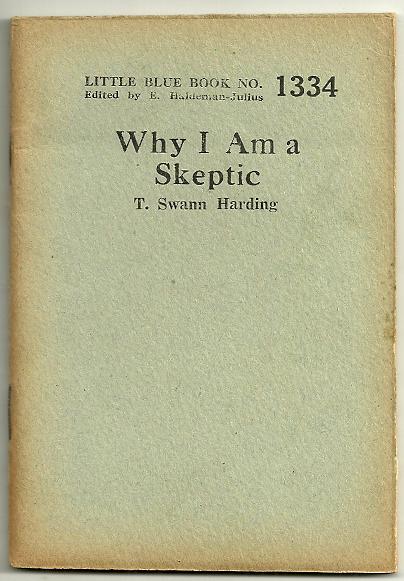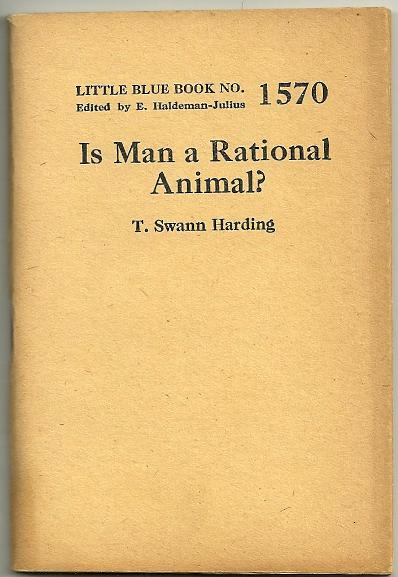T. Swann Harding replaced Harry Elmer Barnes as a Founder of the Fortean Society. As usual, I don’t know how active he was. His papers, now in the Library of Congress, contain correspondence with Thayer, and he did contribute to Doubt, so I assume he was involved more than some of the others.
I haven’t found much about him. An internet search reveals that the T stands for Thomas, that he contributed to a number of magazines and wrote several books, and that he worked for the USDA. In his own writings, he frequently mentions his work as a research chemist.
He wrote fifteen Little Blue Books:
966: The Dawn of Rational Sex Ethics
1272: This Marriage Business
1330: Facts You Should Know about Digestion
1331: How Much Does Man Really Know?
1334: Why I Am a Skeptic
1389: The Truth About the Tobacco Habit
1390: Fact and Fiction About Health
1391: The Magic in Those Ultra-Violet Rays
1441: Do You Know How Ignorant You Are?
1562: How to Live Long
1570: Is Man a Rational Animal?
1604: The Venereal Disease Problem
1677: How the Army and Navy Fight Venereal Diseases
1678: Moral and Social Aspects of the Venereal Disease Problem
1679: Various Types of Venereal Diseases and Their Treatment
He also contributed an essay, “The Portentous Theologian and the Skeptic,” to #1307, “The Word of Satan in the Bible” (named for Louis Adamic’s piece on Ecclesiastes).
He usually wrote about two subjects: medicine and skepticism. Most of the books are collections of shorter pieces; some, maybe most, had appeared previously in the Haldeman-Julius Monthly and other magazines.
The medical works follow the usual Haldeman-Julius custom of debunking unscientific beliefs. I don’t know if ideas on health have changed materially since the ’20s, or if he’s being deliberately contrarian. Probably a bit of both. At any rate, he dismisses the childish superstition that cigarettes are bad for your health, and affirms that ventilation, fruits and vegetables, and exercise are. I haven’t been able to read his ideas on venereal disease; I hope they don’t follow suit. He sets up a few straw men: in a screed against vegetarians, for example, he claims that they’re mystics who restrict their diet in the foolish belief that it will please God. As an old vegetarian myself, I can reassure you that it doesn’t work that way.
Then again, to his credit, he also says that his own doctor took him off meat because it gave him stomach-aches.
Which brings us to his skepticism. He is, throughout these books at least, consistently undogmatic, and writes cheerfully and eloquently about the virtues of suspended judgment and the pitfalls of absolutism. “Why I Am a Skeptic” tells of his mischievous attempts to introduce actual free-thinking and “pleasant skepticism” into a venerable atheist journal. “But the editor caught me in the act! This sort of thing could not be done. At my first mild discharges certain righteous brethren were offended and wrote in discordantly, vastly annoying the genial editor.” After further discussion on the importance of avoiding dogma, he ends “And now the solemn hour approaches when an unlearned skeptic is required by his high and rigid principles to retire to the woodshed and laugh at his own pretensions for such period as will afford him immunity from the bacteria of superiority and portentousness.”
“How Much Does Man Really Know?” is particularly close to Fort (or, for that matter, the skeptical tradition going back to Sextus Empiricus), as he takes on scientific method and the dangers of subjectivity and confirmation bias. In his case, though, he credits Alfred Korzybski, later to become a fortean favorite himself. Here’s a nice bit from near the end, to give you more of the Harding flavor:
“What does all this mean? It means that living as we do in an age of science we should avoid static, finished doctrines which either will not admit new facts or else color these data before permitting them to enter. There is no warrant whatever for the supreme egotism of any individual or group which dares abstract certain selected characteristics from the universe (which is what we all do), to fashion them into an object and to label that highly abstract object universal truth for all men… For the proudest engine of doctrine may at any time be derailed by some trivial stone of fact and pride indeed goeth before a fall.”
Nicely put! And far from the simplistic scientism that is called skepticism nowadays.
You can read #1441, “Do You Know How Ignorant You Are?” online, over here. Well, do you?
(Posted by Doug Skinner)



2 responses so far ↓
1 Win // Sep 17, 2013 at 2:54 am
I enjoyed “Do You Know How Ignorant You Are?” thanks, and came away feeling that by the “Yardstick of Therapeutic Light” I live in a very deep dark hole indeed.
Also just wanted to mention that I’m reading a very nice book informed by Sextus Empiricus called “Beyond Human Nature” by Jesse J. Prinz. He’s a prof at CUNY and his chapters addressing the madness of Noam Chomsky’s linguistic theories are some of the best of that ilk I’ve read.
His overall message is encouraging about the resurgence of the empirical bent in current thought.
2 Doug // Sep 17, 2013 at 8:41 pm
I enjoyed the Harding I read, more than I anticipated. I know virtually nothing of Chomsky’s theories, except that he thinks linguistic structure is instinctual. I may even have that wrong. I’d love to see more of Sextus’s method around; it seems anathema to the current crop of pseudo-skeptics, for whom suspension of judgment is weakness. Read Sextus, everyone!